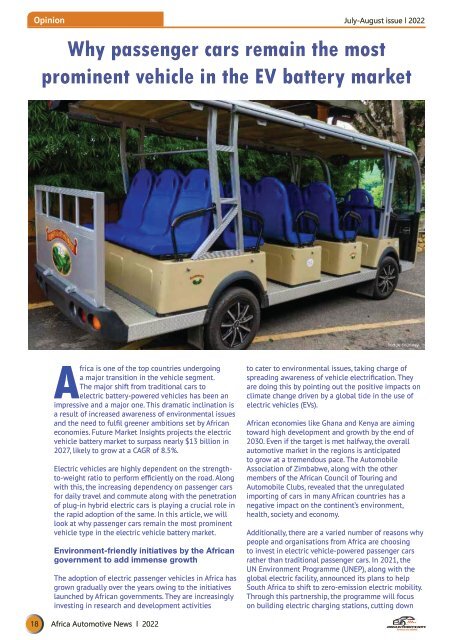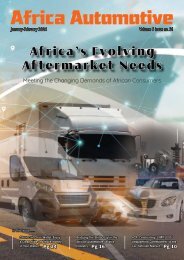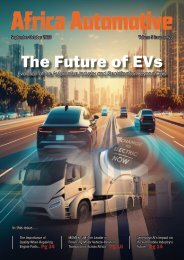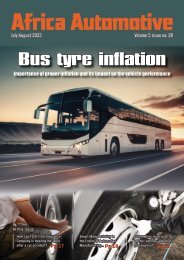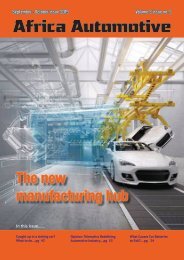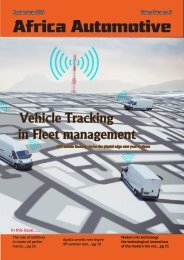Africa Automotive July-August issue 2022
Africa Automotive prides itself to be the ONLY Africa’s leading and MOST authoritative magazine for the automotive industry in Africa with printed copies for the automotive industry decision makers in both government, NGO’s and private sector. The Bi-monthly magazine offers cost effective advertising services that get results and improves growth in the auto B2C and B2B sector, keeping an eye on latest technologies in Africa and across the world, the magazine predominately covers the developments in the Africa auto industry.
Africa Automotive prides itself to be the ONLY Africa’s leading and MOST authoritative magazine for the automotive industry in Africa with printed copies for the automotive industry decision makers in both government, NGO’s and private sector. The Bi-monthly magazine offers cost effective advertising services that get results and improves growth in the auto B2C and B2B sector, keeping an eye on latest technologies in Africa and across the world, the magazine predominately covers the developments in the Africa auto industry.
You also want an ePaper? Increase the reach of your titles
YUMPU automatically turns print PDFs into web optimized ePapers that Google loves.
Opinion<br />
<strong>July</strong>-<strong>August</strong> <strong>issue</strong> l <strong>2022</strong><br />
Why passenger cars remain the most<br />
prominent vehicle in the EV battery market<br />
Image courtesy<br />
<strong>Africa</strong> is one of the top countries undergoing<br />
a major transition in the vehicle segment.<br />
The major shift from traditional cars to<br />
electric battery-powered vehicles has been an<br />
impressive and a major one. This dramatic inclination is<br />
a result of increased awareness of environmental <strong>issue</strong>s<br />
and the need to fulfil greener ambitions set by <strong>Africa</strong>n<br />
economies. Future Market Insights projects the electric<br />
vehicle battery market to surpass nearly $13 billion in<br />
2027, likely to grow at a CAGR of 8.5%.<br />
Electric vehicles are highly dependent on the strengthto-weight<br />
ratio to perform efficiently on the road. Along<br />
with this, the increasing dependency on passenger cars<br />
for daily travel and commute along with the penetration<br />
of plug-in hybrid electric cars is playing a crucial role in<br />
the rapid adoption of the same. In this article, we will<br />
look at why passenger cars remain the most prominent<br />
vehicle type in the electric vehicle battery market.<br />
Environment-friendly initiatives by the <strong>Africa</strong>n<br />
government to add immense growth<br />
The adoption of electric passenger vehicles in <strong>Africa</strong> has<br />
grown gradually over the years owing to the initiatives<br />
launched by <strong>Africa</strong>n governments. They are increasingly<br />
investing in research and development activities<br />
to cater to environmental <strong>issue</strong>s, taking charge of<br />
spreading awareness of vehicle electrification. They<br />
are doing this by pointing out the positive impacts on<br />
climate change driven by a global tide in the use of<br />
electric vehicles (EVs).<br />
<strong>Africa</strong>n economies like Ghana and Kenya are aiming<br />
toward high development and growth by the end of<br />
2030. Even if the target is met halfway, the overall<br />
automotive market in the regions is anticipated<br />
to grow at a tremendous pace. The Automobile<br />
Association of Zimbabwe, along with the other<br />
members of the <strong>Africa</strong>n Council of Touring and<br />
Automobile Clubs, revealed that the unregulated<br />
importing of cars in many <strong>Africa</strong>n countries has a<br />
negative impact on the continent’s environment,<br />
health, society and economy.<br />
Additionally, there are a varied number of reasons why<br />
people and organisations from <strong>Africa</strong> are choosing<br />
to invest in electric vehicle-powered passenger cars<br />
rather than traditional passenger cars. In 2021, the<br />
UN Environment Programme (UNEP), along with the<br />
global electric facility, announced its plans to help<br />
South <strong>Africa</strong> to shift to zero-emission electric mobility.<br />
Through this partnership, the programme will focus<br />
on building electric charging stations, cutting down<br />
18 <strong>Africa</strong> <strong>Automotive</strong> News l <strong>2022</strong>


